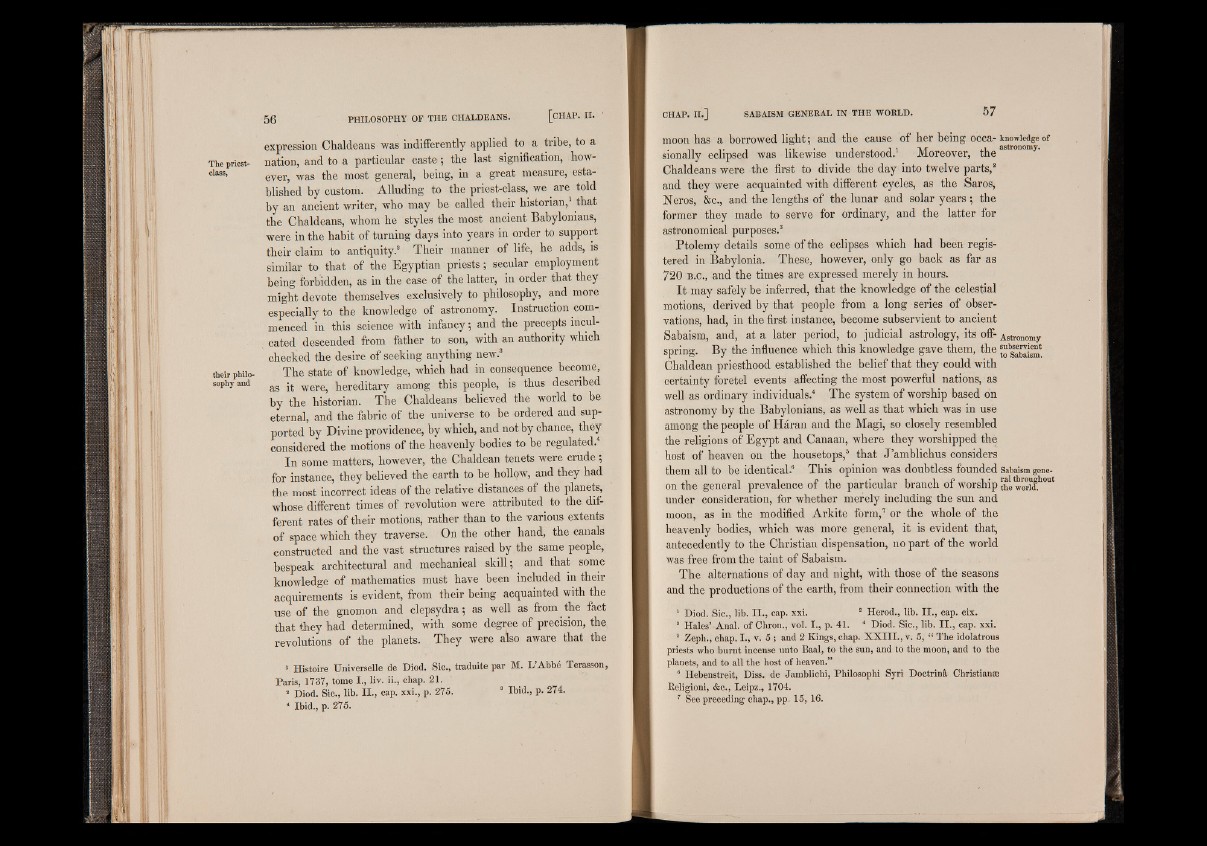
The priest-
class,
their philosophy
and
expression Chaldeans was indifferently applied to a tribe, to a
nation, and to a particular caste •, the last signification, however,
was the most general, being, in a great measure, established
by custom. Alluding to the priest-class, we are told
by an ancient writer, who may be called their historian,1 that
the Chaldeans, whom he styles the most ancient Babylonians,
were in the habit of turning days into years in order to support
their claim to antiquity.2 Their manner of life, he adds, is
s im ila r to that of the Egyptian priests; secular employment
being forbidden, as in the case of the latter, in order that they
might devote themselves exclusively to philosophy, and more
especially to the knowledge of astronomy. Instruction commenced
in this science with infancy; and the precepts inculcated
descended from father to son, with an authority which
checked the desire of seeking anything new.3
The state of knowledge, which had in consequence become,
as it were, hereditary among this people, is thus described
by the historian. The Chaldeans believed the world to be
eternal, and the fabric of the universe to be ordered and supported
by Divine providence, by which, and not by chance, they
considered the motions of the heavenly bodies to be regulated.4
In some matters, however, the Chaldean tenets were crude ;
for instance, they believed the earth to be hollow, and they had
the most incorrect ideas of the relative distances of the planets,
whose different times of revolution were attributed to the different
rates of their motions, rather than to the various extents
of space which they traverse. On the other hand, the canals
constructed and the vast structures raised by the same people,
bespeak architectural and mechanical skill; and that some
knowledge of mathematics must have been included in their
acquirements is evident, from their being acquainted with the
use of the gnomon and clepsydra; as well as from the fact
that they had determined, with some degree of precision, the
revolutions of the planets. They were also aware that the
1 Histoire Universelle de Diod. Sic., traduite par M. I. Abbo Terasson,
Paris, 1737, tome I., liv. ii., chap. 21.
8 Diod. Sic., lib. I I ., cap. xxi., p. 275. 8 Ibid., p. 274.
- Ibid., p. 275.
moon has a borrowed light; and the cause of her being occa- knowledge of
sionally eclipsed was likewise understood.1 Moreover, th eastronomy-
Chaldeans were the first to divide the day into twelve parts,2
and they were acquainted with different cycles, as the Saros,
Neros, &c., and the lengths of the lunar and solar years ; the
former they made to serve for ordinary, and the latter for
astronomical purposes.3
Ptolemy details some of the eclipses which had been registered
in Babylonia. These, however, only go back as far as
720 B.C., and the times are expressed merely in hours.
It may safely be inferred, that the knowledge of the celestial
motions, derived by that people from a long series of observations,
had, in the first instance, become subservient to ancient
Sabaism, and, at a later period, to judicial astrology, its off- Astronomy
spring. By the influence which this knowledge gave them, the
Chaldean priesthood established the belief that they could with
certainty foretel events affecting the most powerful nations, as
well as ordinary individuals.4 The system of worship based on
astronomy by the Babylonians, as well as that which was in use
among the people of Haran and the Magi, so closely resembled
the religions of Egypt and Canaan, where they worshipped the
host of heaven on the housetops,5 that J ’amblichus considers
them all to be identical.6 This opinion was doubtless founded Sabaism gene-
on the general prevalence of the particular branch of worship ihew3hout
under consideration, for whether merely including the sun and
moon, as in the modified Arkite form,7 or the whole of the
heavenly bodies, which was more general, it is evident that,
antecedently to the Christian dispensation, no part of the world
was free from the taint of Sabaism.
The alternations of day and night, with those of the seasons
and the productions of the earth, from their connection with the
1 Diod. Sic., lib. I I ., cap. xxi. 8 Herod., lib. I I ., cap. cix.
8 Hales’. Anal, of Chron., vol. I., p. 41. 4 Diod. Sic., lib. I I ., cap. xxi.
5 Zeph., chap. I., v. 5 ; and 2 Kings, chap. X X I I I ., v. 5, “ The idolatrous
priests who burnt incense unto Baal, to the sun, and to the moon, and to the
planets, and to all the host of heaven.”
6 Hebenstreit, Diss. de Jamblichi, Philosophi Syri Doctrin& Christianas
Keligioni, &c., Beipz., 1704.
7 See preceding chap., pp. 15, 16.